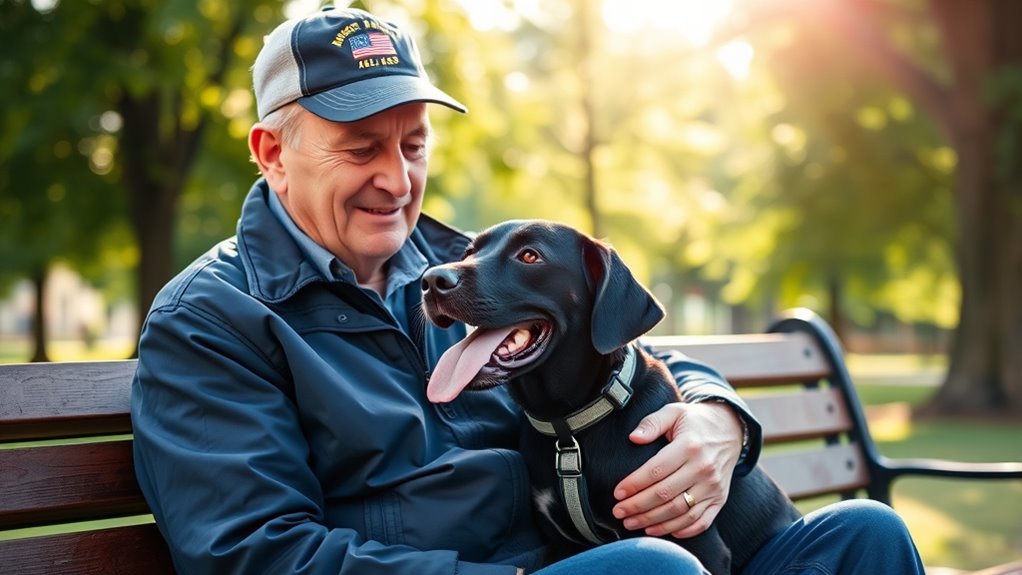Hearing dogs act as battle buddies, alerting you to vital sounds like alarms, doorbells, and sirens, which can be life-saving. They boost your safety, confidence, and independence, making everyday tasks easier and helping you navigate noisy environments. These loyal companions also provide emotional support, reduce feelings of isolation, and strengthen your well-being. Curious how these incredible dogs transform daily life? Keep exploring to discover how they can become your most trusted partner.
Key Takeaways
- Hearing dogs alert veterans to critical sounds like sirens, alarms, and doorbells, enhancing safety and environmental awareness.
- They reduce feelings of isolation and anxiety by providing companionship and emotional support.
- These dogs help veterans navigate noisy or crowded environments, boosting confidence and independence.
- Training ensures dogs respond to individual needs, recognizing important cues and ignoring distractions.
- Successful partnerships improve daily safety, social participation, and emotional resilience for veterans.
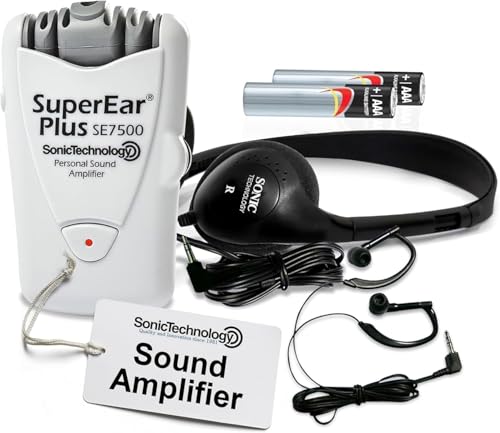
SuperEar Model SE7500 for Seniors - Hearing Amplifiers for Seniors & Elderly, Super Ear Personal Sound Amplifier, Sound Amplifier Listening Device and Audio Accessories in 50dB Ambient Sounds Increase
COMPATIBILITY: Response to sound amplification is completely dependent on an individual's unique ability to detect sounds. For this...
As an affiliate, we earn on qualifying purchases.
Understanding the Role of Hearing Dogs for Veterans
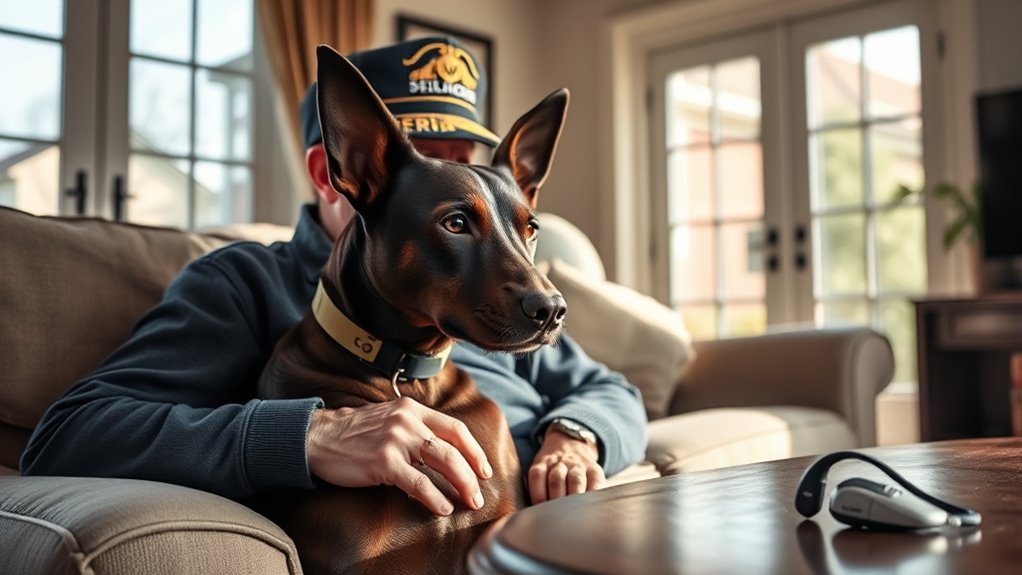
Hearing dogs for veterans play a vital role in helping service members regain independence and safety. These dogs are trained to alert you to important sounds like sirens, doorbells, or alarms, supplementing your hearing aids and enhancing your daily awareness. They serve as active companions, reducing feelings of isolation and increasing confidence in maneuvering busy environments. Supporting this, veteran support groups often provide resources to help you understand hearing aid maintenance, ensuring your devices function properly alongside your hearing dog. Holistic approaches to health and wellness further complement the support provided by hearing dogs, addressing overall well-being. Together, these tools create a thorough approach to improving your quality of life. The bond with your hearing dog fosters trust and reassurance, making everyday tasks safer and more manageable, while veteran support groups connect you with community and ongoing assistance.

WallarGe Rechargeable Neckband Hearing Amplifier for Conversation or TV Watching, Digital Hearing Amplifier for Seniors Adults with Volume Control, Bluetooth Earphones for Seniors
PERSONAL HEARING AMPLIFIER - With the built- in mic collecting the sounds around you, get the ultimate sound...
As an affiliate, we earn on qualifying purchases.
The Training Process Behind Hearing Dogs

You’ll see that training starts with selecting candidates who have the right temperament and skills. Then, these dogs learn specialized tasks to alert their owners to important sounds. This process guarantees each dog is prepared to meet the unique needs of veterans they serve. Incorporating continuous learning into training ensures the dogs adapt to various environments and situations they will encounter. For example, ongoing training programs help maintain and enhance the dogs’ skills over time. Incorporating veteran-specific training helps tailor the dogs’ skills to the individual needs of their handlers, ensuring more effective assistance. Additionally, applying best practices such as regular assessments and collaboration among trainers can significantly improve training outcomes. Emphasizing the importance of training standards maintains consistency and quality across different programs.
Selecting Suitable Candidates
Selecting suitable candidates for hearing dogs is a critical step that guarantees the success of the training process. You begin with thorough candidate screening to identify individuals whose lifestyles and needs align with the dog’s capabilities. During temperament assessment, you evaluate traits such as calmness, patience, and sociability to ensure the dog can handle daily routines and unpredictable situations. It’s essential to choose dogs that are not overly energetic or anxious, as these traits can hinder training and reliability. By carefully selecting dogs that demonstrate a steady temperament and good social skills, you set the foundation for a successful partnership. This step guarantees the hearing dog will be dependable, responsive, and well-matched to the veteran’s environment and needs. Additionally, understanding creating effective training routines can inspire innovative approaches to training and bonding with service dogs. Proper dog selection also helps prevent potential setbacks during training by ensuring compatibility from the start. Incorporating the importance of temperament in the selection process can further improve training outcomes and long-term success. Recognizing pet hair management techniques might seem unrelated, but keeping training environments clean and free of pet fur can contribute to a more focused and efficient training process.
Specialized Skill Development
Once suitable dogs are chosen, specialized skill development begins, focusing on teaching them to recognize and respond to specific auditory cues. You’ll work closely with trainers to reinforce signals for important sounds like doorbells, alarms, and phone calls. During training, dogs also learn to ignore distractions, like background noise or music therapy sessions, ensuring they stay focused. To support their well-being, handlers often implement tailored dietary plans that keep the dogs alert and healthy. You might also practice commands in different environments, simulating real-life situations. Incorporating behavioral conditioning techniques helps enhance the dogs’ focus and responsiveness in various settings.
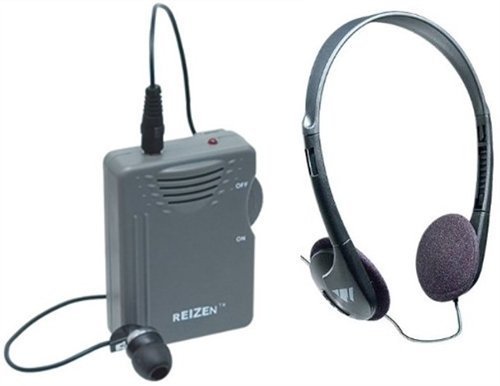
Elite Package: Reizen Loud Ear 120dB Gain Personal Amplifier
Powerful personal amplifier with 120dB gain
As an affiliate, we earn on qualifying purchases.
How Hearing Dogs Enhance Safety and Awareness
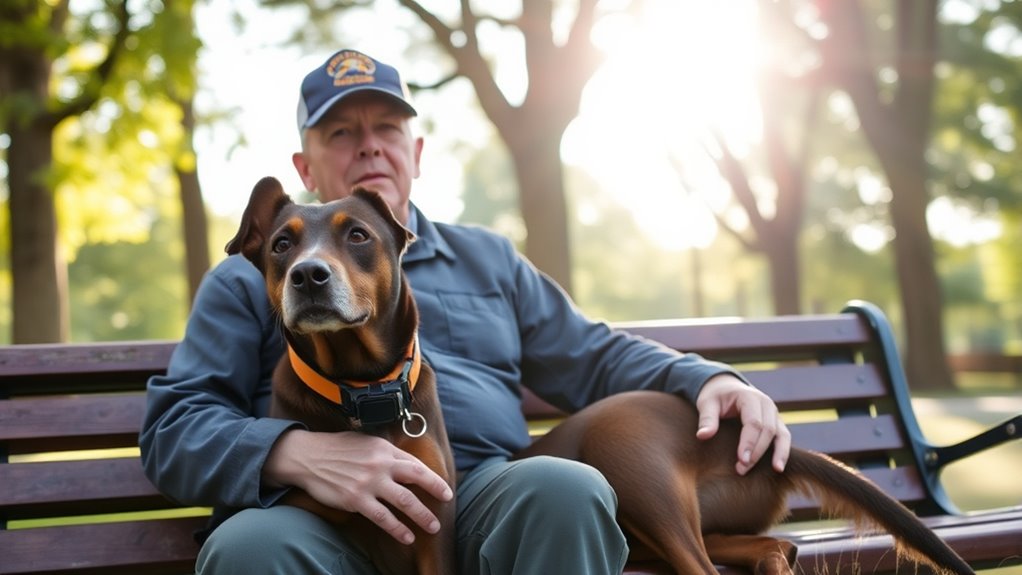
Hearing dogs play an essential role in enhancing safety and awareness for veterans by alerting them to important sounds in their environment. If you experience hearing loss, you might miss key cues like sirens, doorbells, or alarms. Your hearing dog helps bridge this gap by signaling these sounds promptly, keeping you aware of potential dangers. They’re trained to alert you to environmental changes that could impact your safety, such as a smoke alarm or someone calling your name. Environmental awareness is further improved as they recognize and respond to a variety of sounds, providing comprehensive support. This heightened environmental awareness allows you to respond quickly and confidently, reducing risks and increasing independence. With a hearing dog by your side, you gain not only safety but also reassurance, knowing you’re better equipped to navigate your surroundings safely and stay alert to what’s happening around you. Regular training updates can also help maintain their responsiveness to evolving environmental sounds training protocols.

Personal Sound Amplifier PSAP the Latest Gen Model HA9000, Rechargeable Hearing Aid Device Hearing Amplifier with Headphones, Detachable Microphone, Type-C Charging for Seniors, Adults, Elderly
Advanced Sound Amplification and Noise-Canceling: The Latest Gen HA9000 personal sound amplifier features Auto-Gain Control for clearest amplification,...
As an affiliate, we earn on qualifying purchases.
Daily Tasks Made Easier With a Hearing Dog

Having a hearing dog considerably simplifies daily routines by providing immediate assistance with common tasks. If you experience hearing loss, service animals can alert you to important sounds, making everyday life safer and more manageable. With your dog’s help, you can:
Having a hearing dog makes daily routines safer and more manageable through immediate assistance with important sounds.
- Detect doorbells, phone calls, or alarms instantly
- Receive alerts for household sounds, such as oven timers or smoke detectors
- Navigate social settings more confidently, knowing your dog will signal important auditory cues
Best Animal Support can be a valuable resource for training and support. These tasks might seem small, but they profoundly improve your independence and peace of mind. Service animals are trained to recognize and respond to critical sounds, reducing the challenges associated with hearing loss. Their assistance turns complex routines into manageable, everyday activities.
Building a Bond: The Relationship Between Veterans and Their Dogs
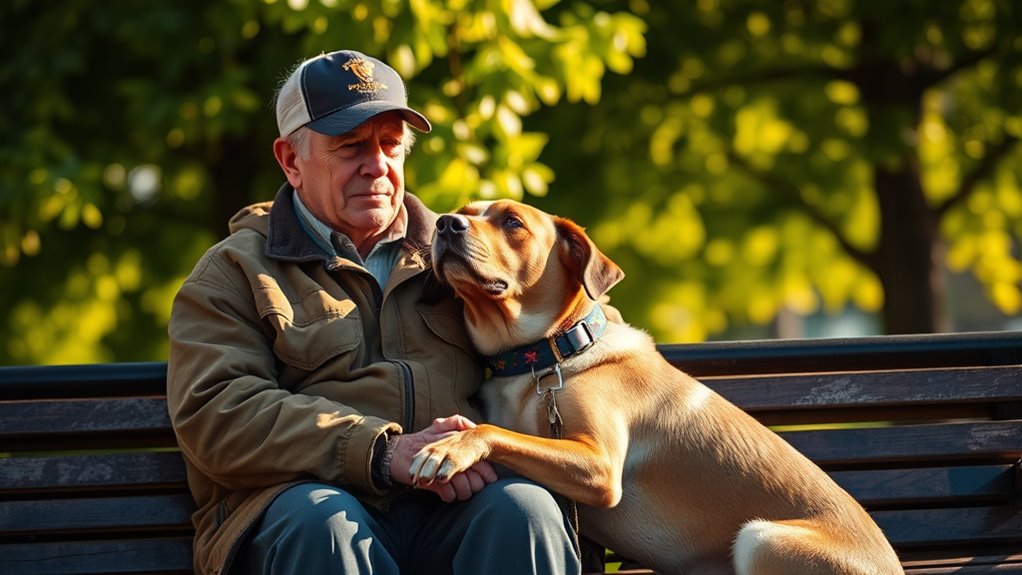
The connection between veterans and their hearing dogs goes beyond simple task assistance; it forms a foundation of trust and companionship. As you spend time together, you’ll develop a unique bond rooted in mutual understanding and reliance. This canine companionship often sparks a sense of veteran camaraderie, where both feel valued and supported. Your dog becomes more than a helper; they’re a loyal friend who listens without judgment and offers comfort during tough times. Through shared routines and quiet moments, you build a relationship based on respect and affection. Over time, this bond helps you feel less isolated, reminding you that you’re not alone. The trust you cultivate with your hearing dog becomes a crucial part of your daily life and recovery journey. Incorporating consistent training techniques can also improve color accuracy and ensure your dog responds reliably in various situations. Additionally, understanding the IRA investment strategy can be vital for managing your finances during retirement, ensuring that your income is maximized and taxes are minimized. Developing training techniques tailored to your dog’s needs can further strengthen this bond and improve its effectiveness. Moreover, utilizing AI-driven support systems can enhance your ability to communicate and access resources, fostering greater independence and confidence in daily activities. Building a strong cookie management approach can also help you navigate privacy preferences and improve your overall digital experience.
Success Stories: Veterans’ Experiences With Hearing Dogs

Many veterans find that hearing dogs substantially improve their daily communication, helping them stay connected. These dogs also boost independence, allowing veterans to manage tasks more confidently. As you read their stories, you’ll see how emotional well-being often rises alongside these practical benefits. Recognizing the patterns in angel numbers can further inspire hope and guidance on their journey toward love and connection. Incorporating mindful decluttering strategies into training and support services can enhance the overall effectiveness of assistance programs for veterans. Additionally, leveraging automation in business can optimize training processes and resource management for assistance organizations. Implementing compassionate training methods rooted in understanding and patience can further improve the bond between veterans and their hearing dogs.
Enhanced Daily Communication
How do hearing dogs transform daily communication for veterans? They provide sensory enhancement that bridges the gap caused by hearing loss, allowing you to detect important sounds more effectively. Your communication improves as the dog alerts you to vital noises, like doorbells or alarms, that might otherwise go unnoticed. This immediate feedback helps you stay connected and responsive throughout your day. Hearing dogs also reduce the frustration associated with missed cues, making your interactions more seamless.
Consider these key benefits:
- *Real-time alerts that boost awareness of your environment*
- *Enhanced ability to respond promptly to sounds*
- *Greater confidence in orienting social and safety situations*
Increased Independence Levels
Hearing dogs do more than improve communication—they empower veterans to regain control over their daily lives. With their keen awareness, they help you navigate noisy environments by alerting you to important sounds, reducing your exposure to noise pollution. This increased awareness means you no longer have to rely solely on others for assistance, boosting your independence. Hearing protection is naturally built into their alerts, allowing you to respond confidently to alarms, doorbells, or sirens. As a result, you can participate more fully in social activities and manage everyday tasks without constant supervision. Veterans often find that their confidence grows as they experience fewer limitations, knowing their hearing dog is there to support their autonomy and safety at all times. Additionally, the health benefits of sound awareness provided by hearing dogs can contribute to overall well-being, making daily life more comfortable and less stressful.
Emotional Well-being Boost
For veterans, the emotional toll of hearing loss can be overwhelming, but hearing dogs provide more than just practical assistance—they offer a profound boost to mental well-being. These loyal companions deliver therapeutic benefits that foster emotional resilience, helping you feel more connected and secure. Many veterans report a renewed sense of hope and reduced anxiety simply through the companionship of their hearing dogs. The dogs’ consistent presence can help ease feelings of isolation and restore confidence in daily interactions. Their ability to alert you to sounds and provide comfort during stressful moments makes a significant difference. Understanding the benefits of service animals can further highlight how these dogs contribute to emotional stability.
Challenges Faced in Integrating Hearing Dogs Into Everyday Life

Integrating a hearing dog into daily routines can present significant challenges, especially when adapting to new behaviors and expectations. Noise sensitivity is a common issue; loud environments can overwhelm both you and your dog, making it harder to focus or feel comfortable. Social integration also poses hurdles, as others may not understand your dog’s role or might react unpredictably. You might find yourself adjusting routines to avoid noisy or crowded places, which can be frustrating. Additionally, training your dog to respond appropriately in different settings takes time and patience. You’ll need to establish consistent cues and boundaries, all while managing the social landscape around you. These challenges require ongoing effort but are essential for creating a harmonious relationship that truly benefits your daily life.
How to Access Hearing Dog Services for Veterans

Accessing hearing dog services as a veteran involves a straightforward process, but it requires knowing where to begin. First, you need to confirm your service eligibility, which typically involves providing documentation of your military service and hearing impairment. Next, you’ll go through the application process, which includes submitting forms and medical evidence to authorized organizations. Once your application is reviewed and approved, you’ll be matched with a hearing dog suited to your needs. To streamline this process, consider the following steps:
- Contact accredited service dog organizations for guidance
- Gather necessary medical and military service documentation
- Complete the application forms accurately and promptly
The Future of Hearing Assistance and Support for Veterans

Advancements in technology and increased awareness are driving significant improvements in hearing assistance for veterans. You can expect new devices that better detect and translate sounds, making daily life safer and more manageable for those with hearing loss. Service animals, especially hearing dogs, will continue to play a crucial role, offering emotional support alongside their practical help. Future innovations may include smart harnesses or wearable tech that sync with hearing aids, providing real-time alerts for alarms, sirens, or conversations. As research progresses, training programs will become more personalized, ensuring each veteran receives support tailored to their needs. The combination of evolving technology and compassionate service animals promises a future where hearing loss doesn’t limit your independence or quality of life.
Frequently Asked Questions
How Long Do Hearing Dogs Typically Serve Their Veteran Partners?
Hearing dogs typically serve their veteran partners for 8 to 10 years, though lifespan expectations can vary based on factors like health and care. The training duration usually takes 4 to 6 months, ensuring they’re well-prepared to assist. During their service, you’ll find that they become invaluable companions, providing essential support, and their longevity depends on regular veterinary check-ups and proper training maintenance.
Are Hearing Dogs Covered by Veterans’ Health Insurance or Assistance Programs?
You wonder if hearing dogs are covered by veterans’ insurance or assistance programs. Typically, insurance coverage varies, but many assistance programs, like VA benefits, often include support for hearing dogs. You should check your specific insurance plan or assistance programs to confirm coverage details. Some organizations also offer grants or subsidies, making it easier for you to access these essential services and enhance your daily life.
Can Hearing Dogs Be Trained to Recognize Specific Sounds Unique to Individual Veterans?
You can have hearing dogs trained with custom sound recognition and personalized training techniques to identify specific sounds unique to you. This tailored approach helps your dog alert you to important sounds like doorbells or alarms, ensuring safety and independence. By customizing training, you get a service dog that understands your individual needs, providing a higher level of support and reassurance in your daily life.
What Is the Typical Cost Involved in Obtaining a Hearing Dog for a Veteran?
The cost overview for obtaining a hearing dog typically ranges from $15,000 to $30,000, but many veterans pay little or nothing thanks to funding options. Organizations like the VA or non-profits often cover or subsidize these expenses. You should explore funding options early, as they can make acquiring a hearing dog more affordable. With proper support, you can access this life-changing assistance without bearing the full financial burden.
How Do Hearing Dogs Adapt to Changes in Their Veteran’s Environment or Routine?
Hearing dogs develop environmental adaptation and routine flexibility over time by closely observing their veteran’s habits and surroundings. They learn to respond to changes, like new noises or altered routines, by adjusting their alert signals and behaviors. This training guarantees they remain effective regardless of environmental shifts or routine adjustments. Your hearing dog’s ability to adapt helps you feel secure and supported, no matter what changes occur in your daily life.
Conclusion
Did you know that over 80% of veterans with hearing loss find a significant boost in independence and safety thanks to hearing dogs? These loyal companions do more than alert you to sounds—they become your trusted battle buddy, enhancing daily life and emotional well-being. If you’re a veteran facing hearing challenges, reaching out for a hearing dog could transform your world. With support and training, you can regain confidence and reconnect with your surroundings like never before.

